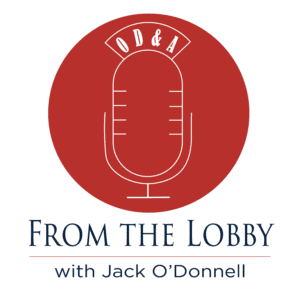
Good Morning from Election Central…
Game time. Months, years, and even lifetimes; it all comes down to Election Day tomorrow for elected officials across the country at every level of government.
The biggest race we are watching is the contest for Governor of New York where incumbent Governor Kathy Hochul is looking to hold off a spirited challenge from Member of Congress Lee Zeldin. On Thursday, Vice President Kamala Harris and Hillary Clinton held a rally with Governor Hochul and Attorney General Tish James at Barnard College to gin up support among the Democratic base, particularly women. Hochul, James, Harris, and Clinton are the first women to hold or have held their respective offices and their message was clear: we will not be the last.
Last night, President Joe Biden headlined state Democrats’ largest rally yet (Biden’s third trip to New York in the past two weeks, raising questions about the state of play that would require so much of POTUS time in such a deep blue state countered perhaps with the question about where else Biden could possibly be a political asset). Joining the Governor at Sarah Lawrence College in Yonkers, Biden said, “New York, you have two days to make sure the rest of New York knows the good that they have in Kathy Hochul.”
National Republicans are rallying around their candidate as well, with Florida Governor Ron DeSantis and Andrew Giuliani headlining an event for Zeldin last week on Long Island. Glenn Youngkin, the Republican Governor from Virginia who won an upset victory of his own, also came to New York to stump for Zeldin.
At his campaign headquarters last week, Zeldin previewed his potential state budget; indicating he would do away with the personal income tax and the estate tax (critics were quick to point out those proposals would benefit the state’s wealthiest individuals and could require spending cuts to Medicaid and public schools). Zeldin also voiced support for opening-up the Southern Tier to fracking, a practice currently banned by New York. To address rising crime, Zeldin has pledged to declare a state of emergency on day one as Governor and fire District Attorneys he believes are not tough enough.
Governor Hochul also has big plans if reelected. She plans to address the affordability crisis across the state by investing in housing and jobs. Her first budget allocated $25 billion to develop 100,000 new housing units and if elected to a full term, she plans to get that number closer to 500,000. She also pledged to make New York more business-friendly by investing the necessary funds to attract mega-projects like Micron. On the public safety, Hochul’s plan is centered on addressing gun violence.
It also matters what candidates eat. There has been no shortage of cringy moments involving candidates and food throughout American politics. From Gerald Ford eating the outer husk of a tamale in Texas, to Bill DeBlasio eating pizza with a fork in New York City, voters do not easily forget food gaffes on the campaign trail.
Seriously, this race will be determined by swing voters in the suburbs and urban turnout. White suburban women, a demographic largely responsible for electing President Biden in 2020 and President Trump in 2016. have been moving towards Republicans in recent weeks and a new poll suggests concerns about inflation and the economy are behind that swing. The poll found that suburban white women now prefer a Republican candidate for Congress by 15 points. Democrats hoped that the Dobbs decision would motivate this demographic, which makes up 20% of the electorate, but the economy is taking center stage in this election with 74% of respondents saying the economy is headed in the wrong direction compared to 59% just one month ago. When asked about the number one issue motivating them to vote, 34% selected rising prices, 28% citing threats to democracy, and 16% choosing the Supreme Court overturning Roe. White suburban women are also one of the most-motivated demographics, with 85% of voters reporting they were “very motivated” to vote. In the 2018 midterms, this group was the driving force behind Democrats picking up 40 seats and a majority in the House. Now, they trust Republicans over Democrats to get the economy back on track. Half of respondents said Republicans have a better economic plan compared to 35% for the Democrats, and 55% believe Republicans have a better plan to combat inflation versus 24% for the Democrats. Republicans were also favored on topics such as crime and foreign policy while Democrats were preferred on lowering prescription drug costs and reproductive health. Abortion rights is still a deciding factor for some suburban women but, in general, it is taking a backseat to financial concerns and crime. The poll is not good news for President Biden either: 38% approve and 60% disapprove of his job performance compared to August when 51% approved and 48% disapproved.
The other factor is turnout. Early vote numbers are down in New York City compared to 2020. It is not really a fair comparison (midterm vs. presidential; Trump election vs. Trump not on the ballot) but worth noting they are down more in the Bronx, Queens, and parts of Brooklyn with higher percentages of Black and Brown voters than in Manhattan. In what numbers these “base vote” constituencies vote will have a huge impact on the outcome in New York State.
For Zeldin to overcome Hochul’s likely margins in NYC, he will need to win swing voters, particularly on Long Island and in parts of New York City’s northern suburbs, and win the turnout battle. Zeldin and his campaign are hoping that unhappiness with the current status quo in New York will outweigh swing voter’s concerns about Republican extremism and his ties to Donald Trump.
Down ballot, turnout from the governor’s race and these larger national dynamics could have some very real consequences in races for United States Congress, State Senate, and Assembly across New York State. While the State Senate and Assembly majorities are safe, key members of Majority and Minority Conferences have difficult races that will be worth watching. Perhaps most importantly, New York State has emerged as a key battleground in the fight for the majority of the United States House of Representatives. These races were further complicated by a fraught redistricting process, which has in some cases pitted incumbents against incumbents. Here are some of the races for House, State Senate, and Assembly in New York that we are watching tomorrow:
Congress
Nationally, some Democrats are fed up with the Federal Reserve and Chairman Jerome Powell’s decision to further raise interest rates. In the sixth interest rate hike of the year, the Fed raised interest rates by .075%, increasing the cost of borrowing money in the hopes of staving off a recession. A group of 11 lawmakers, led by Senators Elizabeth Warren and Bernie Sanders, wrote a letter to Powell in which they criticized his decision, saying it will only hurt working class families and will not curb inflation. The letter stated, “These statements reflect an apparent disregard for the livelihoods of millions of working Americans, and we are deeply concerned that your interest rate hikes risk slowing the economy to a crawl while failing to slow rising prices that continue to harm families.”
The day after midterm elections is the unofficial start date of the 2024 Presidential contest and Biden reaffirmed his commitment to seek reelection. When asked, Biden said, “I have not made that formal decision, but it’s my intention. My intention to run again. And we have time to make that decision.” Biden, like Donald Trump, may be waiting to officially declare his candidacy as long as he can to skirt some of the burdensome fundraising regulations that accompany a formal declaration. A lot also depends on what happens Tuesday night- a crushing loss for Democrats might make Biden reconsider.
Biden has been huddling since September to lay out a reelection plan with First Lady Jill Biden and a small number of close advisors, three of which are reported to be Anita Dunn, Mike Donilon and Jen O’Malley Dillon. While the timing of any such announcement is important, some believe that is does not make much of a difference when he declares given that he will still be out doing public events and garnering media attention as President anyway. However given the fundraising arms race and competition for top campaign talent, Biden will have to make a decision sooner rather than later.
With Republican control of the House looking increasingly likely, one of their first housekeeping tasks will be selecting which members will serve on the Steering & Policy Committee. The committee is tasked with doling out standing committee assignments as well as highly-sought after chairmanships. On November 16th, the Republicans will conference to solidify the rules and structure of the steering committee before internal, regional elections on November 16th. Those who are selected will make decisions that will preview the direction and attitude of a GOP-controlled House. The House Freedom Caucus has been warning members to be prepared for the vote, which could get contentious.
Aside from the interparty reshuffling, there will also be legislating to do after the elections. “We still have much to do and many important bills to consider,” Senate Majority Leader Chuck Schumer said in remarks on the Senate floor at the end of September. “Members should be prepared for an extremely, underline extremely, busy agenda in the last two months of this Congress.” Lawmakers have a December 16th deadline to pass a bill to fund the government and must iron out the National Defense Authorization Act by year’s end. The Senate Judiciary Committee is expected to confirm a number of federal judges in the lame duck, especially if they lose the majority.
Election officials across the country have been warning for months that we may not know all the results on Tuesday night. States such as Pennsylvania and Wisconsin do not permit absentee ballots to be processed until election day and in Nevada, counties have four days to process late-arriving mail-in ballots and give voters two more days to fix mail-in ballots. Georgia requires candidates for Senate to receive at least 50% of the vote and if neither candidate reaches that threshold, they go to a run-off. So while everyone will be eagerly awaiting results on Tuesday night, some states might not have final results for days.
Back in New York…
A state appeals court overturned an earlier ruling that restricted access to absentee voting. The Republican-led lawsuit did not want the fear of catching COVID or other infectious disease to be a permissible reason to vote via absentee ballot. State Supreme Court Justice Dianne Freestone originally agreed with Republicans and struck down the measure. However, a five-judge panel in the Appellate Division ruled unanimously to overturn her ruling.
-Jack O’Donnell

Our Podcast is Back!
Client News: Viridi Parente Has Big Plans to Expand in Buffalo
In Cases Challenging Affirmative Action, Court Will Confront Wide-Ranging Arguments
In The News
Biden Administration Sends $250M Military Aid for Ukraine
Trump Could Clinch the Nomination Before the G.O.P. Knows If He’s a Felon
Steve Scalise Diagnosed with ‘Very Treatable’ Blood Cancer
Eminem’s Beef with GOP Presidential Contender Ramaswamy Using His Music
X (Twitter) to Allow Political Ads from Candidates, Parties Ahead of U.S. Election
TV News Crew Robbed at Gunpoint While Reporting on Armed Robberies
Millions of Salaried Workers Would Receive OT Under Biden Administration Proposal
Liberals Raise Alarms, Calling on Biden to Sharpen Reelection Pitch
Biden Struggles to Make ‘Bidenomics’ a Plus, Not a Minus
Work Advances on Centennial Park, Northland Corridor Projects
Worth a Read
Biden Looks for New Ways to Energize Black Voters
Republican Women, Fearing Backlash on Abortion, Pivot to Birth Control
3 Hosts of an Eric Adams Fund-Raiser Are Said to Face Indictment
How the ‘Urban Doom Loop’ Could Pose the Next Economic Threat
This Fall's Covid Variant Might Really Be Different
NASA Spacecraft Reunites with Earth After 17-Year Trip Around the Sun
They Came to Find the Loch Ness Monster. What If They Do?
How the War in Ukraine Turned Tennis into a Battlefield
The Chess Cheating Scandal Ends with an Awkward Handshake
REM Sleep Is Magical. Here’s What the Experts Know.
Why the 1973 New York State SuperFair was Not So Super
Discover New York City's Seven Best Dive Bars
The 1980s Preppy Handbook is Again a Must-Read



